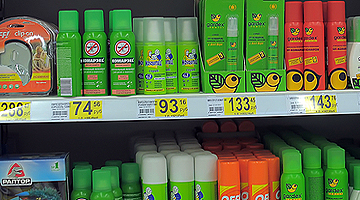Whether you’re heading to Brazil for the Games in August or just taking a short winter break in Fiji, the last thing you’ll want to bring home is dengue, chikungunya or Zika.
With no vaccines available to travellers for these nasty viruses, avoiding infection means dodging mosquito bites.
But, what really prevents bites from the aggressive, day-time biting Aedes species that transmit all three diseases, or other biting insects?
A new US study published in Consumer Reports compared the effectiveness of insect repellents. It confirmed what we knew: Products containing any of 3 active ingredients — DEET, Picaridin, or oil of lemon eucalyptus — work well against Aedes and Culex mosquitoes and Lyme disease-carrying deer ticks, while those marketed as ‘natural’ offered little protection, especially against Aedes mozzies.
But, the active ingredient’s concentration is just as critical. Repellents containing 15% - 30% DEET provide long-lasting protection against mosquitoes and ticks, while others with 7% DEET didn't work well against Aedes mozzies. (DEET is safe for children, and pregnant and lactating women, too.)
A product containing 20% Picaridin was the study's top overall repellent, but one containing a 5% concentration of Picaridin scored far lower. Oil of lemon eucalyptus was the only naturally occurring compound to do well in the tests: Other plant oil-based products containing cedar, citronella, lemongrass, or rosemary provided little protection and often failed within 30 minutes. Once again, they were particularly ineffective against Aedes mosquitoes.
What works, what doesn't
A recent article by Beth Skwarecki neatly sums up the state of play as to what works and what doesn’t when it comes to products that claim to repel insects:
Wristbands and pricey gadgets don’t prevent mosquito bites. A wristband protects only your wrist, while ultrasonic devices don’t work at all.
Clip-on devices. They protect you from bites, but only if you sit still.
Some plants are natural repellents. But, planting them nearby isn’t enough.
Insect traps can be problematic. They may attract more mosquitoes than they kill.
Candles provide partial protection. There is some benefit – depending on which way the wind is blowing. Citronella candles don’t seem to work any better than plain candles.
Insecticide-treated clothing is worth the trouble. But, treated clothing works best with long sleeves and pants, and used in conjunction with an effective topical repellent applied to all exposed skin.
So, for now at least, the proven options are still the best – regardless of the maker’s claims, or how convenient or appealing the flashier gimmicks might appear.
But, select the repellent right for you (including kids) and read the label closely.

